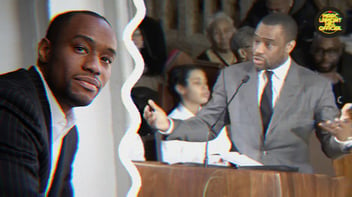Progressive Spotlight: Briahna Joy Gray.
Gray Won’t Back Down.
 Image Description: A photo of Briahna Joy Gray alongside the logo for her Bad Faith podcast.
Image Description: A photo of Briahna Joy Gray alongside the logo for her Bad Faith podcast.
Briahna Joy Gray’s emergence has come at precisely the right time.
She’s made her mark as an independent journalist who’s unafraid to challenge conventional wisdom or push boundaries—even when she knows doing so isn’t in her best interest professionally.
A critic of the “vote-Blue-no-matter-who” strategy that has gripped the Democratic Party since Donald Trump became president in 2016, Gray often challenges her audience to look beyond bogeyman politics and confront the underlying issues in American politics. Her position is not all that different from so many on the left who point to Trump as a symptom of an insidious disease coursing through the system.
In her view, if Medicare for All is hugely popular, for example, why accept the Democrats’ corporatized approach to healthcare instead of fighting for something the vast majority of Americans support?
In some ways, Gray’s approach makes her a controversial figure on the left even though others, such as the journalist Chris Hedges and the economist Richard Wolff, have been making similar arguments for years.
Gray’s rise to prominence in the leftist and progressive space came during her work as national press secretary for Bernie Sanders’ 2020 presidential campaign. After Sanders’ second bid for president ended in defeat (thanks, Democratic establishment), Gray transitioned to journalism, eventually joining The Intercept as senior politics editor. She then started the “Bad Faith” podcast and co-hosted The Hill’s popular political streaming show “Rising.”
Both platforms have proved useful to Gray—with her podcast allowing her to have wide-ranging discussions about policies or major events, and “Rising” putting her in a position to challenge right-wing ideologies.
One of those doors closed for Gray when she was relieved of her co-hosting duties from “Rising” earlier this year following an interview she did with an Israeli hostage’s sister. Specifically, Gray’s infamous “eye roll” sealed her fate, which she has since said was in reaction to broader frustrations she had with her producer and the segment itself.
As we wrote about previously, tension had been building at “Rising” for months due to Gray’s insistence on covering Israel’s genocide of Palestinians. Its producers, according to Gray, had decided to dedicate a single “Israel” block per show—a curious choice given the scale of Israel’s slaughter, its collateral consequences, and the impact it was having on the U.S. domestic front, not to mention potentially destabilizing the entire region.
Gray’s accustomed to generating criticisms from both sides. And she’s no stranger to being at the center of the disagreement around political strategy on the left. Three years ago, progressives, especially on social media, were battling over the best way to leverage their power in Congress. Gray was among those who suggested progressives hold off on supporting Nancy Pelosi for the speaker of the House and force a vote for Medicare For All. Everyone, it seemed, had an opinion, with some speculating that such a move would amount to a performative stunt.
Among those who disagreed was the journalist David Sirota, who wrote in Daily Poster (before it became The Lever): “If members of the Congressional Progressive Caucus were serious about championing Medicare for All—and about using their momentary power in the Speaker race as leverage—they could do much more than merely push for a ceremonial Medicare for All vote that might be helpfully clarifying but also would very likely fail.”
Gray responded with her own piece in Current Affairs, writing: “Importantly, even a failing floor vote would force Democrats to own their opposition to a life-saving, popular policy, and it would expose those Democratic House members who are thought to have cosponsored Medicare for All to burnish their progressive bonafides without ever intending to vote for the bill. For example, Kamala Harris and Cory Booker cosponsored the Senate version of the bill but reversed their positions during their presidential campaigns. Forcing a vote on H.R. 1384 would pressure House Democrats to either support the bill or defend their ‘no’ votes as single-payer’s popularity spikes.”
Either way, there’s never been a vote on Medicare For All, and the left remains bitterly divided on “force the vote.”
“Bad Faith” is now Gray’s full-time gig. With the presidential campaign in full swing, Gray hasn’t shied away from her instincts: challenge the status quo. It likely won’t help her win back any lost support or endear her to moderate Democrats, but she’s probably okay with that. From our perspective (well, the guy writing this), there’s plenty of room at the table for varied voices. And that especially includes someone willing to deal with the consequences of standing up for Palestinians.
Image Sources
Rashed Mian is the managing editor of the award-winning News Beat podcast and co-founder of the newly launched Free The Press (FTP) Substack newsletter. Throughout his career, he has reported on a wide range of issues, with a particular focus on civil liberties, systemic injustice and U.S. hegemony. You can find Rashed on X @rashedmian and on Bluesky @rashedmian.bsky.social.


